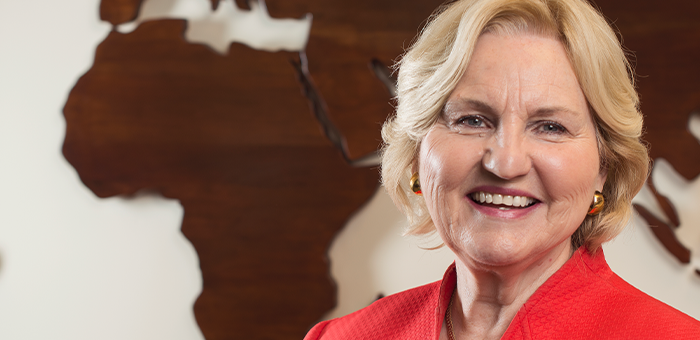Wayne Gretzky’s number has been permanently retired from the National Hockey League. No player will ever again wear number 99. It is an interesting tribute to a player described by Time Magazine as “a most unlikely one.” Even in his prime, Gretzky wasn’t very fast; his shot was oddly weak, and he was last on the team in strength training. He explained his unlikely success with these words: “Maybe it wasn’t talent the Lord gave me. Maybe it was passion.” Nicknamed “The Great One,” there is a widespread opinion in the sports world that he is not only the greatest hockey player ever but that there may never again be anyone else as good. He led the game even though he wasn’t as talented as other players on his team. And he led the team to win four Stanley Cups with the Edmonton Oilers and set a long list of other hockey records.
No one asked him to retire; he decided on his own that it was time. “This is not the first time Gretzky has considered retiring; he talked about it in 1991 and 1993. But each time he has proved too talented; even last year, he led the league in assists. But this year [1999] Gretzky has dealt with persistent neck pain from injury, and though he’s the best player on his team, he has seen his skills deteriorate.” It was not an easy decision. But Gretzky knew the time had come.
The truth is, there is no formula for knowing when to quit. Most leaders struggle with the decision unless it’s made for them by illness, termination, or some other external factor.
Some suggest leaders should develop at least one other significant interest or skill throughout their career. You may passionately lead an organization but also be good at something else, like running a small business, writing, music, stamp collecting, antique auto appraisals, or spiritual direction. Not only will this help you through the leadership years by giving you the benefits of different perspectives and healthy diversions, it will also give you an alternate identity. One reason some leaders stay too long is that they totally identify themselves with their leadership role. She sees herself as the president of the organization. He cannot distinguish between who he is as a dean and who he is as a person. His preaching and personhood are so enmeshed that it is impossible for him to think of continuing as a person without preaching. When a leader has multiple opportunities for self-definition and fulfillment, there is greater likelihood of a wise and timely decision to quit.
The external reason is different. It focuses on the organization or ministry and asks, “Am I able to give the best that is now needed?” Gretzky had to admit that he was past his peak. While still good, he was no longer at the top of his game. The team and the sport that he loved deserved better than he could offer. It was time to hang up the skates. Few leaders are able to make this decision without the advice of others. Unfortunately, long-term leaders seldom get very direct advice on this question from people inside the organization. It may take counsel from outsiders or from other leaders who have stepped down to convince a leader that stepping down is the right decision to make.
Christian leaders, most of all, must be careful they don’t stay in leadership so long that they damage their followers and dishonor their Lord.
A Standing Ovation
A young English pianist gave his inaugural concert to a full house in a London hall. His music was brilliant, and when he finished, the crowd gave him a long-standing ovation. Young and shy, he retreated backstage. The stage manager urged him to return for a bow and an encore, but the young pianist refused. The manager insisted. “The entire audience is standing and clapping for you,” he said, insisting that the pianist return to the stage. “Not everyone is standing,” the young musician replied. “There is a gray-haired man in the balcony who remains seated.” The manager peeked out. “You’re right,” he said. “But everyone else is standing. He makes no difference. Don’t worry about him. Just go back out there.” The young pianist replied, “He is my teacher.”
Whether young or old, each of us has people whose praise means more to us than everyone else combined. In our audiences we see some more clearly than others and we always want to know if they approve or disapprove of the leadership we have given.
That’s the way it was for another young man whose story is told in the Bible. Stephen was an emerging leader of the new Jerusalem church who took on a very difficult assignment. He set out to present Jesus Christ to a hostile religious crowd. His speech was brilliant, but the crowd turned against him and took up rocks to stone him to death. As the stones hit him, “Stephen, full of the Holy Spirit, looked up to heaven and saw the glory of God, and Jesus standing at the right hand of God. ‘Look’ he said, ‘I see heaven open and the Son of Man standing at the right hand of God’” (Acts 7:55-56). Usually the Bible describes Jesus as “sitting at the right hand of the Father,” but for Stephen, Jesus stood. Stephen was a leader in tough times — and he finished well.
May you, too, finish well. May you be the kind of leader for whom Jesus stands.
Leith Anderson brings the help and hope that leaders need in today’s complex world. His counsel is sound, practical and full of hope to pastors, church leaders and lay Christians. This excerpt from “Leadership That Works” © 2001 by Leith Anderson is used by permission of Baker Publishing House. Order at BakerPublishingGroup.com.
Leith Anderson is president emeritus of the National Association of Evangelicals and pastor emeritus of Wooddale Church in Eden Prairie, Minnesota. He served as NAE president from 2007–2019, after twice serving as interim president. He served as senior pastor of Wooddale Church for 35 years before retiring in 2011. He has been published in many periodicals and has written over 20 books. Anderson has a Doctor of Ministry degree from Fuller Theological Seminary, and is a graduate of Moody Bible Institute, Bradley University and Denver Seminary.




 View All Articles
View All Articles 





























